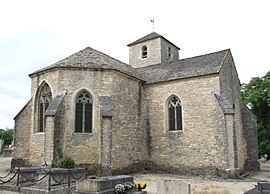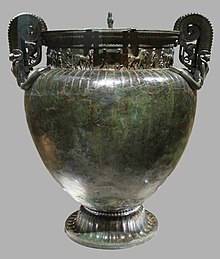Vix, Côte-d'Or
Appearance
Vix | |
|---|---|
 The church in Vix | |
| Coordinates: 47°54′22″N 4°32′24″E / 47.906°N 4.54°E | |
| Country | France |
| Region | Bourgogne-Franche-Comté |
| Department | Côte-d'Or |
| Arrondissement | Montbard |
| Canton | Châtillon-sur-Seine |
| Intercommunality | Pays Châtillonnais |
| Government | |
| • Mayor (2022–2026) | Benigne Scordel[1] |
| Area 1 | 3.53 km2 (1.36 sq mi) |
| Population (2021)[2] | 98 |
| • Density | 28/km2 (72/sq mi) |
| Time zone | UTC+01:00 (CET) |
| • Summer (DST) | UTC+02:00 (CEST) |
| INSEE/Postal code | 21711 /21400 |
| Elevation | 196–306 m (643–1,004 ft) (avg. 328 m or 1,076 ft) |
| 1 French Land Register data, which excludes lakes, ponds, glaciers > 1 km2 (0.386 sq mi or 247 acres) and river estuaries. | |
Vix (French pronunciation: [vi(ks)]) is a commune in the Côte-d'Or department in eastern France.
Archaeology
[edit]
The area around the village of Vix is the site of an important prehistoric complex from the Celtic Late Hallstatt and Early La Tène periods, comprising an important fortified settlement and several burial mounds. The most famous of the latter, the Vix Grave, also known as the grave of the Lady of Vix, dates to circa 500 BC. Her grave had never been looted and contained remarkably rich grave offerings, including a great deal of jewellery and the Vix krater, the largest known metal vessel from antiquity.
Population
[edit]| Year | Pop. | ±% p.a. |
|---|---|---|
| 1968 | 85 | — |
| 1975 | 85 | +0.00% |
| 1982 | 81 | −0.69% |
| 1990 | 95 | +2.01% |
| 1999 | 107 | +1.33% |
| 2009 | 110 | +0.28% |
| 2014 | 110 | +0.00% |
| 2020 | 100 | −1.58% |
| Source: INSEE[3] | ||
See also
[edit]References
[edit]- ^ "Répertoire national des élus: les maires" (in French). data.gouv.fr, Plateforme ouverte des données publiques françaises. 6 June 2023.
- ^ "Populations légales 2021" (in French). The National Institute of Statistics and Economic Studies. 28 December 2023.
- ^ Population en historique depuis 1968, INSEE
Wikimedia Commons has media related to Vix (Côte-d'Or).




